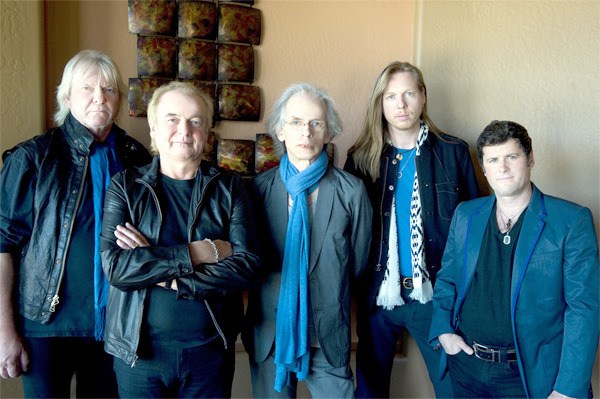Prog rock is not dead. Far from it: Progressive music prophets Yes, who play Thursday at Snoqualmie Casino in concert with Peter Frampton, continue to spread the good word of the experimental, jazz-influenced form of rock and roll.
“I’m proud to be a prog rocker,” said Yes guitarist Steve Howe, who spoke to the Valley Record from his Los Angeles hotel during his American tour.
“Yes is a paradoxical group,” said Howe, 63, who joined the Yes lineup in 1970. His guitar sounds helped define the English group’s classic sounds, on albums such as the Yes album, Fragile and Close to the Edge.
Progressive rock evolved from the psychedelic music of the 1960s, and while the band band didn’t agree with the “progressive” label at first, “it’s what we basically were,” Howe said.
In that era, “record labels didn’t know what to do,” he said. “It was a bit like a jazz era in rock.”
Albums were directed by bands, not labels.
“It was a tremendously empowering feeling to be able to deliver exactly what you wanted,” Howe said.
The Yes lineup changed in the early 80s, with Howe leaving the group in 1980. The changed group went on to record a surprise number-one U.S. hit, “Owner of a Lonely Heart,” with a much different feel than the previous decade’s prog feel.
In the meantime, Howe joined the supergroup Asia. He has also put out solo records and performs with his Steve Howe Trio.
The original Yes began to reform in the late 80s, with Howe rejoining the group in 1995. The band continues to put out new albums.
Musical origins
Howe’s inspiration came from the founders of rock and roll in the 1950s and 60s. Musicians like Les Paul and Chet Atkins deeply influenced young Howe’s musical future.
“My parents had records by Tennessee Ernie Ford, Speedy West, Jimmy Bryant and Les Paul,” Howe said. “They didn’t know they were setting me up to be a guitar player.”
He started playing at age 10, and found his tastes straying from more popular sounds into blues, joining a bluesy rock group.
“My brother and sister thought rock and roll was rubbish,” he said. Howe thought it was exciting.
“I could get very moved by music,” he said. “I love a great singer and a great tune.”
Yes’s tour lineup frequently changes. The band changes songs, but can’t stray from fan favorites.
“These are the songs that connect most with our audience,” Howe said. “There is a challenge in every song to play.”
Balancing popular numbers like ‘Lonely Heart,’ “We want to show the 20-minute, epic side of Yes,” Howe said. “Yes has an amazing repertoire. We can’t play it all in one night.”
For Howe, the life of a rock star is about being real.
“An artist is someone who demands to do things his way,” he said. Howe deplores narcotics, and has explored meditation and vegetarian diet in his efforts to find the real.
Too often, he said, musicians enter a false cocoon.
“The stage is like a zoo,” he said. “They pay money to look at you.
“The way I get real about my beliefs in music is to disconnect from convention,” Howe added. “I don’t go around professing political or religious beliefs. Everybody should be themselves.”
Howe’s sounds with Asia have been picked up in videogames such as Guitar Hero.
While such technology doesn’t come close to the reality of being a real guitar hero, it could be an inspiration, Howe said.
“The guitar is a remarkably flexible instrument,” he said. “In the last 50 years, it has done nothing but morph and change, and be a sponge for people’s ideas.”
Howe has picked up traces of progressive rock in today’s popular music.
“It does come back subtly through other forms of music,” he said,
To Howe, the advent of digital music doesn’t mean that the album form of Yes’s heyday is dead.
“Albums that are deep and strong still sell,” he said. “Artists like me want to carry on. It has to be deep and strong and real. It’s music that feels good to play.”
• Yes and Peter Frampton play at 6 p.m. Thursday, July 15, at Snoqualmie Casino.



